5 affordable housing projects top the list in Eugene seeking city funding in 2024
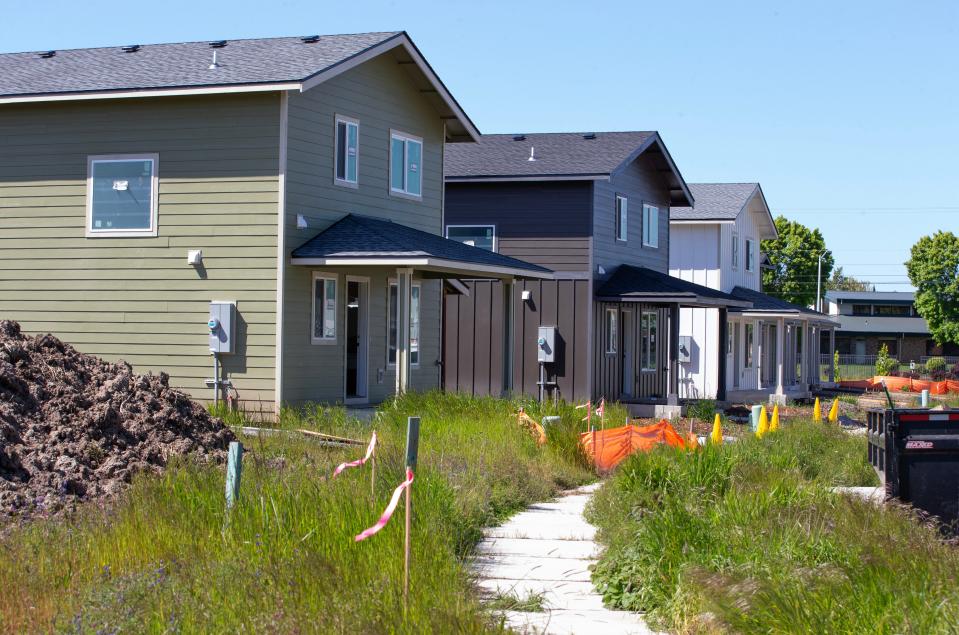
Housing in Lane County is a complex subject.
Eugene has been identified as a city with severe rent burdens, a place where many households pay more than 50% of their incomes on rental housing costs. In 2022, 31.3% of households were considered severely rent-burdened. Lane County’s homelessness dashboard counted 4,578 unhoused individuals in March of 2024.
Eugene’s Affordable Housing Trust Fund (AHTF) is just one of the tools used by the city to identify projects that could effectively develop more affordable housing. After multiple meetings, the committee advising the AHTF is getting its 2024 project funding recommendations ready to present to the City Council.
A look at the AHTF’s 2024 Requests for Proposals
This year, the AHTF has $1,056,545 of funding available for distribution.
Four proposals and a request for gap funding were received for the 2024 round of funding. In total, these four projects, not including the gap funding proposal, requested $1,947,049. Here’s a look at each project proposal.
Floral Hill by DevNW
DevNW's Floral Hill proposal is for funding the new construction of 36 affordable units, providing 100 bedrooms in the south Eugene Laurel Hill Valley Neighborhood. Eight units are planned as two-bedroom spaces and 26 are planned to be three-bedroom units, two of which would be ADA-income-qualified housing units. The 3.89-acre site would have a mix of two- and three-bedroom townhomes alongside three-bedroom detached homes.
The management model utilizes a Community Land Trust to support accessible and affordable homeownership. The project design includes space for outdoor gardening and community amenities such as playgrounds and seating areas.
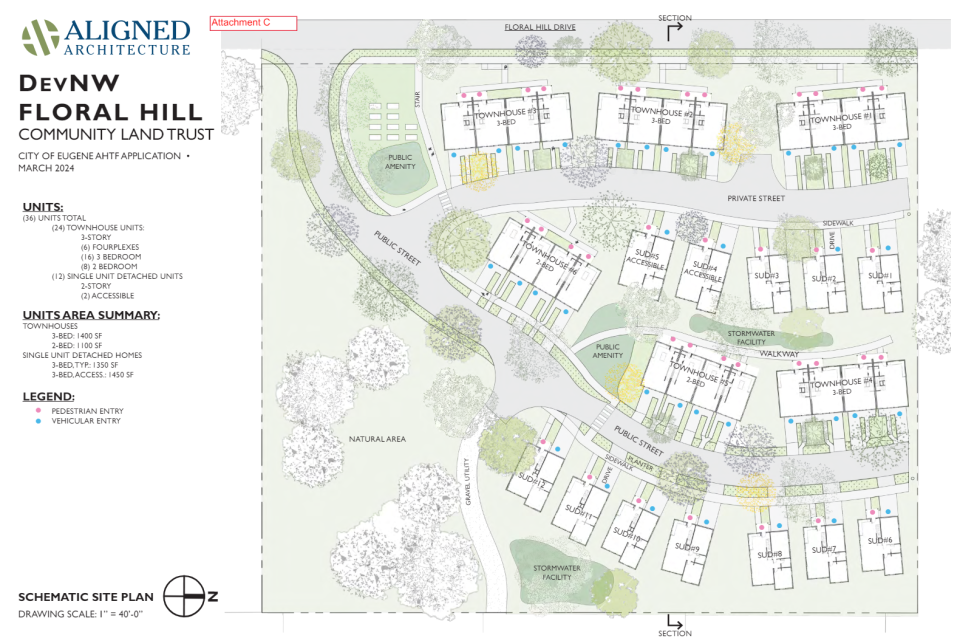
Floral Hill hopes to serve households earning 61 to 80% Area Median Income (AMI). The project requests $600,000 from the AHTF. DevNW is also planning to apply for LIFT and Congressional Directed Spending funding to support this project. If funded, the project would complete site preparation and construction in phases lasting approximately two to three years each. Prior to starting a new phase, the newly constructed dwellings would be sold.
Following obtaining funding, site work timelines are expected to last from June 2025 to April 2026. Phase one of home construction would begin in May 2026 and hopes to conclude in April 2027 for home sales from May to September 2027. Phase two home construction is expected to begin in May 2027 and conclude in April 2028. These second-phase homes would then be sold from May to September 2028.
Nelson Place by DevNW
This proposal is requesting funding to support improvements to HVAC systems in 28 homes already constructed as part of the first phase of project construction. In total, Nelson Place aims to provide 31 affordable units with 81 bedrooms as part of a Community Land Trust model to support low-income homeownership.
Phase one of this development is nearing completion in west Eugene’s Bethel neighborhood across the street from Prairie Mountain K-8 School. Phase one construction consisted of three three-bedroom homes and the construction of nine market-rate, two-bedroom, two-bathroom townhomes. Twelve residencies from Phases two and three are expected to be two-bedroom homes and 16 are planned as three-bedroom homes.
Unlike other project proposals, DevNW is requesting AHTF funding to install cooling provisions in units. The units now have cadet heating but lack a cooling capability, which DevNW wrote in its proposal as an urgent need for residents as temperatures escalate in warmer weather.
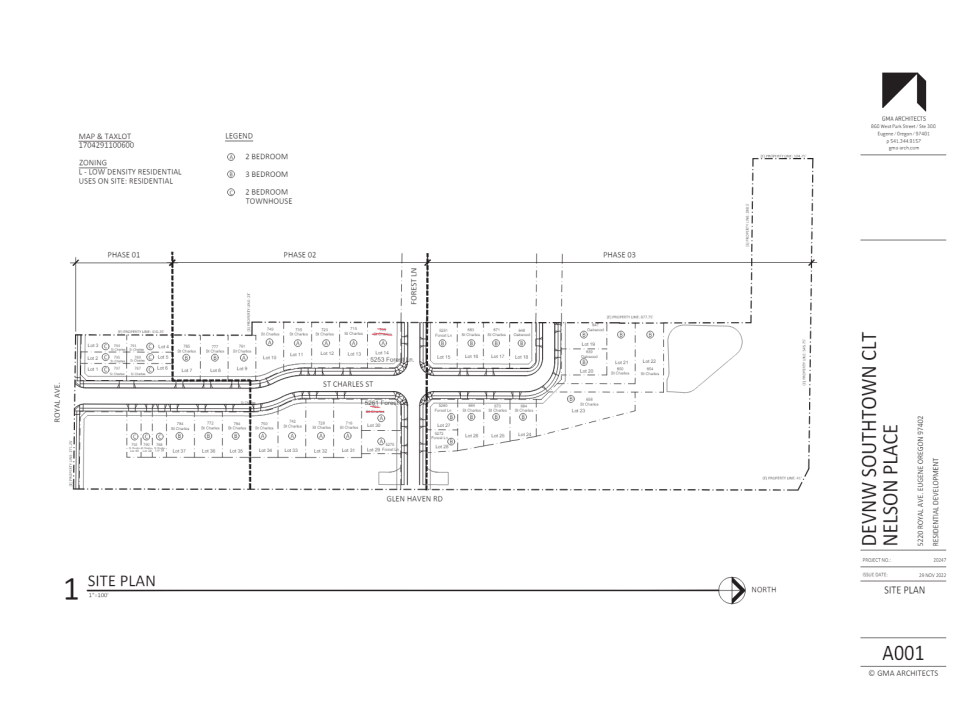
DevNW uses community building and neighborhood revitalization strategies to support grassroots efforts to develop more engaging, supportive and vibrant communities. Past neighborhoods where their work was focused include Eugene’s Whiteaker Neighborhood and current focuses consist of downtown Springfield and southtown Corvallis. DevNW’s Flo-Grove project supported the development of six CLT homes in Cottage Grove and 12 in Florence, which was completed in 2020-2021.
Nelson Place aims to serve households earning 60 to 80% AMI and is requesting $231,532 of AHTF funding for these improvements. The project proposal notes that all other funding for this project has been secured and that AHTF money would allow the developer to add to the scope of their work with HVAC improvements and to fold that funding into the construction of Phase Two.
Construction for Phase One is expected to wrap up in July with home sales expected between July and September of 2024. Phase two is expected to start construction soon and hopes to conclude this December with home sales occurring from January 2025 to May. Phase three is planned for construction starting this November and aims to end in July of 2025. Homes constructed in Phase Three are expected to sell between August and December of 2025.
The Lucy by Cornerstone Community Housing
This proposal is for a new construction project of 36 affordable rental units, totaling 75 bedrooms located east of 870 Hunsaker Lane. There are six one-bedroom units, 19 two-bedroom units and nine three-bedroom units along with 48 parking spaces proposed for the 1.8-acre parcel of land.
The project is intended to serve individuals, families and families with children. It is designed as two three-story residential buildings with a community building intended to provide a campus-like environment, according to the project proposal. Centralized community spaces would include a play area, rain gardens and a community room for hosting on-site resident services and providing community partners with space. The community building is also intended to house a full kitchen and storage space for community events.
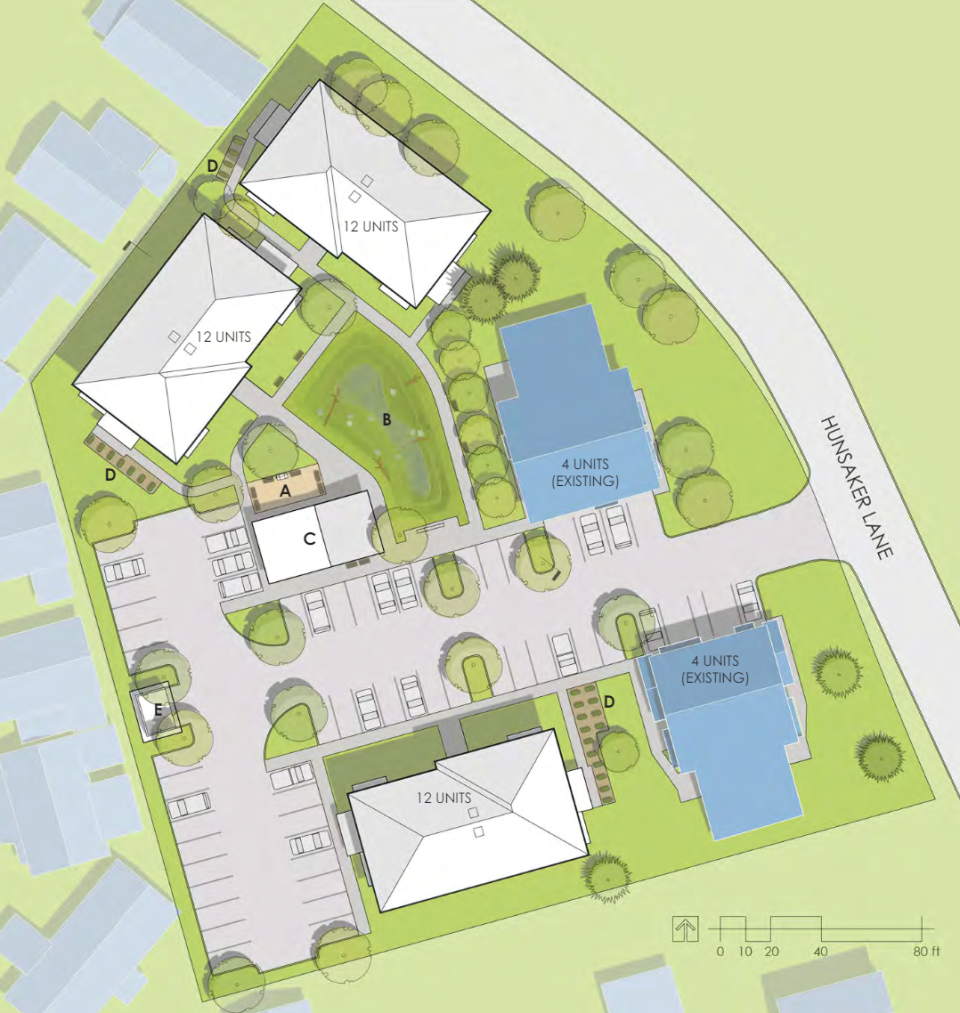
Cornerstone Community Housing has been supporting individuals and families across Lane County for over 30 years by developing affordable housing and providing supportive services to promote overall wellness and economic security and independence. Projects such as the Springfield Apartments proposed in partnership with the Hope and Safety Alliance received supportive funding in late 2023, showing the organization’s commitment to providing not only safe and affordable housing but also ensuring that housing is robustly supported by community partners.
The target population this development wants to serve is households earning 51 to 60% AMI. The project’s funding request is for $587,245. Additionally, Cornerstone Community Housing is seeking project funding from the Oregon Housing and Community Services Centralized Resource Offering program. Project timelines expect construction to begin in July of 2025, conclude in summer of 2026 and to fulfill lease-ups in November of 2026.
Rosa Village by SquareOne Villages
This project is a proposal for the new construction of 52 affordable homes, totaling 64 bedrooms. There are 40 one-bedroom units proposed and 12 two-bedroom units proposed for the 3.3-acre lot at 2243 Roosevelt Blvd. Forty-four parking spaces are included in the project plans. Co-located on the northern 1.3 acres of the lot is SquareOne’s Opportunity Village Eugene, a transitional tiny home community housing 30-40 people at a time.
The property plans to be constructed with a village model, including a 1,600 square foot common house that will provide shared amenities like meeting space, a place for residents to do laundry or get their mail, store bikes or access shared tools. Plans also include outdoor gardening space as well as a fenced-in dog park. The management model implements a Community Land Trust with Leasehold Cooperative, which developer and manager SquareOne Villages has utilized in past developments like Emerald Village in Eugene and Cottage Village in Cottage Grove. In this model, the co-op leases the property from SquareOne Villages, which ensures the permanent affordability of the units through the Community Land Trust model. This management model leases homes to co-op members, unlike SquareOne’s Peace Village, where co-op members own the homes on SquareOne Villages' land.
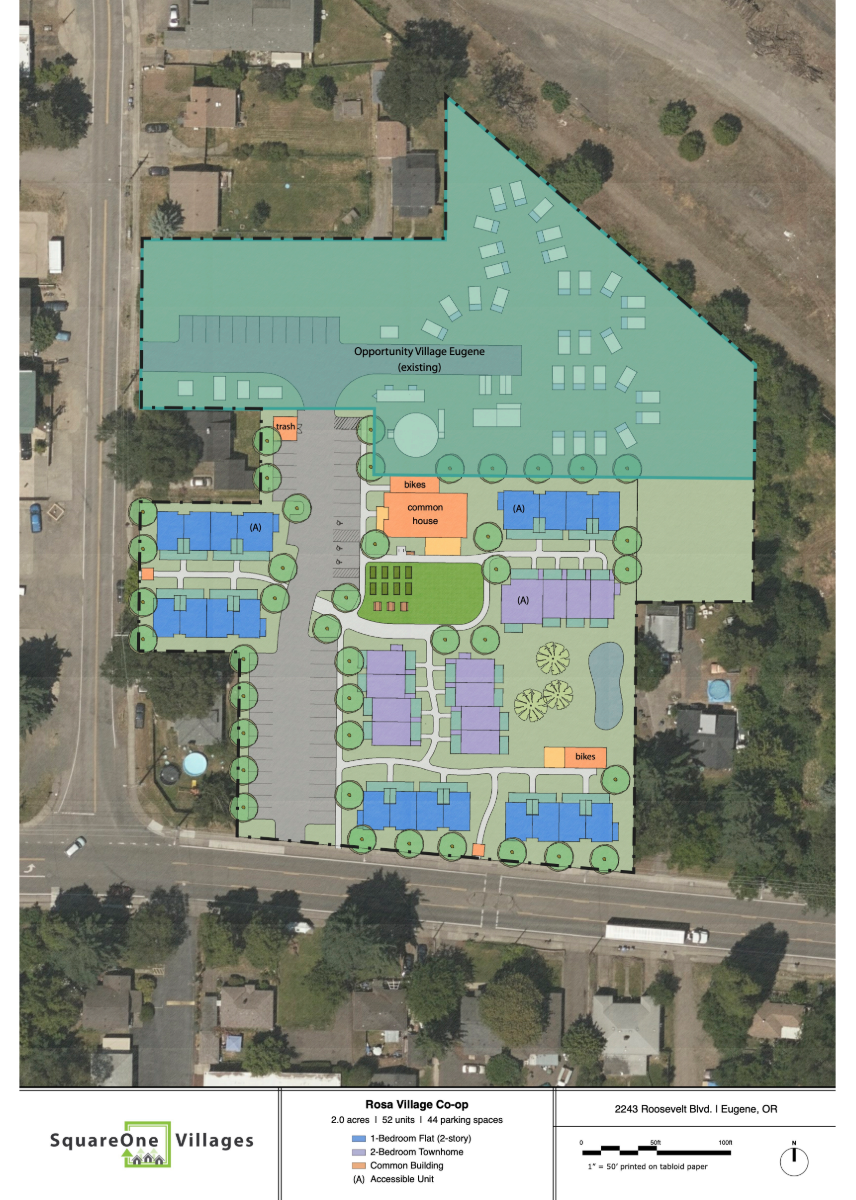
SquareOne Villages has a number of other developments putting the organization’s “village model” to use with years of operations in their repertoire such as Emerald Village, Cottage Village and the C Street Co-op in Springfield, in addition to Peace Village in Eugene.
The development aims to serve people earning between 31 and 50% AMI and is requesting $528,272 from the AHTF. In addition to requests for ATHF support, Rosa Village is applying for LIFT funds to help finance the project. Once full funding is secured, SquareOne anticipates construction to begin in March of 2025, with initial occupancy expected for April of 2026.
Williams Place gap funding request
Williams Place is a development St. Vincent de Paul of Lane County is currently constructing to serve veterans. The 10-unit project is located off of River Road near the Santa Clara Transit Station and would work specifically with individuals partnering with Supportive Services for Veteran Families and Veterans Affairs Supportive Housing.
This project received AHTF support in last year's funding cycle. While construction for this project is about 75% completed, a funding gap still exists for the project. The request for 2024 AHTF funds for this development totals $100,000.
What counts as Affordable housing?
Affordable Housing refers to income-qualified and subsidized housing targeted for low-income individuals, usually those who earn 80% of or less than the AMI, which is $49,950 annually for a household size of one in Eugene for 2024. In a city where households can be severely rent-burdened, housing is considered affordable when a tenant does not spend more than a third of their monthly income on rent and utility costs.
What is the Affordable Housing Trust Fund?
The AHTF provides funding to housing projects that support underserved populations and communities across Eugene. This support can come in the form of housing project gap funding, acquisition of current housing developments that can become affordable housing and through other financing like down payment assistance for home buyers and direct rent assistance.
The AHTF has an advisory committee that provides recommendations to city staff on how to best utilize AHTF funding in each annual cycle. The fund’s priorities are to support the creation of housing that innovates and benefits residents through how the project is designed, financing options available to future occupants or provides a novel management structure, such as utilizing Community Land Trusts like the Peace Village Co-Op managed by SquareOne Villages, which received AHTF funds in 2023.
Advisory Committee input and scoring
Proposals are assessed by the AHTF Advisory Committee, which generates recommendations for the city to utilize in deciding which projects receive what funds.
Committee members utilize a scoring system to determine which projects to fund based on a number of criteria. Members assess six elements of each proposal and score them based on a scale of one to 10: project concept and design, site feasibility, income-qualified population, cost-benefit, financial feasibility and organizational experience.
Scoring for each project this year was nearly within a full point average for three out of four of the proposals. Projects can earn up to 60 points if scored perfectly across all criteria.
The average scores were as follows:
Rosa Village - 47.25
The Lucy - 47.00
Nelson Place - 46.75
Floral Hill - 40.00
The AHTF funding pool is largely contributed to by Construction Excise Taxes. Housing Tools Analyst Laura Hammond said these CET funds, combined with City Fee assistance funds and general funding provided by the City Council make up the money available for annual AHTF awards.
Following the Advisory Committee’s recommendations generated at its April 25 meeting, the most likely scenario for this year’s AHTF funding is to provide funding for the top two scoring projects, Rosa Village and The Lucy, as well as to provide gap funding for Williams Place. This funding scenario would also provide SDC fee assistance to the four project applicants who applied for exemptions.
Hammond said each year, the priorities for the advisory committee’s project scores change slightly to ensure that approved projects are serving the community’s direct needs. She said this year’s criteria put a focus on developing Affordable ADA units, so projects proposing the development of more accessible units received additional points in the scoring process.
Generating these scores means that committee members spend significant time reading through lengthy project proposals and asking questions to dig deep on how exactly these proposed projects would pencil out if given AHTF dollars to utilize. Hammond said all this committee work is commendable and feels grateful to have reached this point in the funding cycle process.
“I think this is always an exciting point in the process and I’m so grateful to our committee members because they put in a lot of time and work … I think they’re super thoughtful and it’s a hard thing to do,” Hammond said.
“We’d love to be able to fund all of these projects and that’s the hard part about an RFP (Request for Proposal) process is that typically, you can’t do that, you have to have some folks who are going to get funding and unfortunately some who this time around aren’t going to get funding. I’m feeling very grateful and excited that we’re at this point in the process and looking forward to taking it to City Council.”
What’s next?
Now that proposals have been reviewed and scored by the AHTF Advisory Committee, city staff will generate recommendations that are scheduled to be presented to the City Council on June 10.
Once the Council provides direction on funding recommendations, agreements will be drafted to outline funding requirements for developers. AHTF funds usually come to projects as reimbursements, so as developers generate and pay invoices throughout the project, those invoices are sent to AHTF staff, who reimburse the project developer. About 10% of an AHTF development award is held until construction is complete and the project obtains certificates of occupancy.
Hannarose McGuinness is The Register-Guard’s growth and development reporter. Contact her at 541-844-9859 or hmcguinness@registerguard.com
This article originally appeared on Register-Guard: 5 affordable housing projects in Eugene seeking city funding in 2024
